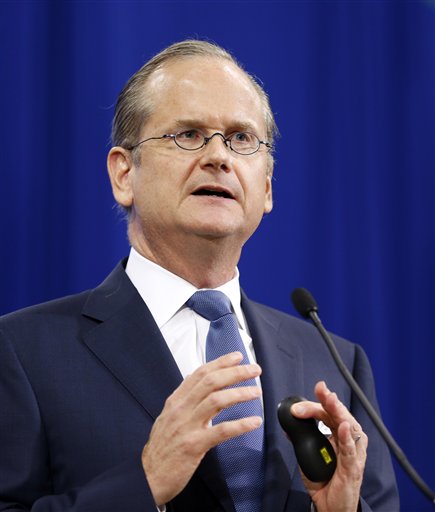“Veritas” was the Roman goddess of truth and the mother of Virtue. The Harvard University motto today is “Veritas,” – truth – but as in many things academic, some push the limits of that definition, perhaps harder than most would readily accept.
Last summer, Harvard Professor Larry Lessig said he would run for president if he raised $1 million by Labor Day. He didn’t, as Lachlan Markay reported in The Washington Free Beacon. “Raised,” at least in my experience, means what you actually brought in, not promises or pledges to give; remember the old comic strip character Wimpy’s famous line: “I’ll gladly pay you Tuesday for a hamburger today”? Or better yet, the line from the movie Jerry Maguire: “Show me the money!”
If you want to be more precise, the Federal Election Commission – not a particularly good guide for truth, but still the arbiter of what must be publicly counted and reported in things election-related – says you only count actual receipts. That’s simple enough: “raised” – at least for federal candidates – equals receipts, not promises.
I tweeted around a link to Markay’s story, finding it interesting. Lessig, apparently, did not, complaining that “It is the nature of truth these days to be viewed through a partisan lens.” Seeking a non-partisan analysis, Lessig invited me to review, not his receipts, but his own promise. He said: “as many news outlets reported at the time, our goal was to raise $1M in crowdfunding pledges —including amounts paid immediately and amounts pledged in advance — by September 7.” (emphasis in original).
Though claiming I am his “regular critic,” Lessig complimented me: “I’d trust him to report the truth accurately.” I appreciate Larry’s compliment. I am happy to give that sort of non-partisan analysis, and I will do my best not to view this through a “partisan lens.”
Whatever Larry thought he was pledging to do, it seems to me that it was widely understood to mean something akin to “money in the door.”
I’ve watched all the videos I can find of Lessig making his announcement, and he never specifically addresses the question. It’s certainly possible I’ve missed some. I also went through every link on the first two pages of results for a Google search of “Larry Lessig million labor day.” Not one media report I reviewed says a word about “pledges.” Not one. So if “many news outlets” reported that, it doesn’t seem to include the most prominent and obvious ones. I can’t even find Lessig media releases that say that. Here’s how “news outlets” described Lessig’s plan prior to and immediately after Labor Day:
Slate: “Lawrence Lessig, a Harvard law professor, announced that he would run for president if he receives $1 million in donations by Labor Day.” (emphasis added).
Washington Post: “Lessig said he would spend the next month testing the waters to determine whether he would have enough support and resources to wage a credible campaign. If he raises $1 million by Labor Day, he said, he will formally launch his candidacy. If not, he will return the money to donors and go home.” (emphasis added).
International Business Times: “Harvard law professor and campaign-finance reform advocate Lawrence Lessig hit his fundraising goal of $1 million dollars on Sunday… Lessig’s million-dollar haul still leaves him lagging well behind current Democratic Party favorite Hillary Clinton, who raked in $45 million in just the first quarter of fundraising this year, according to NBC News. Meanwhile, Clinton’s populist rival Sen. Bernie Sanders (Ind.-VT) took in $15 million.”
NPR: “Lawrence Lessig met his self-imposed goal of crowdfunding $1 million by Labor Day.” (I suppose the word “crowdfunding” is ambiguous enough to include promises to pay, since Kickstarter, for example, collects a kind of promise to pay if the effort reaches its target, but that’s kind of an outlier in this context, especially since he pledged to “return the money to donors” if his goal wasn’t reached.)
Wall Street Journal: “Democratic candidate and Harvard law professor Lawrence Lessig, who has close ties with Silicon Valley, raised $1 million for his presidential campaign in the last month, he said Monday.” (emphasis added).
NBC News: “Lessig’s campaign says it reached its goal of raising $1 million by a Labor Day deadline.”
CNN: “The news came just a few hours after he tweeted about reaching his funding benchmark. ‘WE DID IT!!! ($1M in < 4 wks)’”
US News: “He will officially launch his presidential campaign if he raises $1 million by Labor Day.”
Center for Public Integrity: “you’ll love Lawrence Lessig, who promised to run if his exploratory effort raised $1 million by Labor Day. (It did.)”
Forbes: “If he manages to raise one million dollars by Labor Day, Lessig will officially declare his candidacy.”
And there’s this from ABC News: “His on-line campaign topped the million dollar stake he needs to launch his campaign.” (Notice the graphic at the 12 second mark in: “$1,003,189 Donated.” (emphasis added)).
We could go on, but you get the picture. He asked me to check, and I did. If Larry or anyone ever said they were including non-binding pledges in that $1 million, it escaped pretty much everybody else, not just Lachlan Markay.
I don’t know about you, but we at CCP don’t say we’ve “raised” money unless people have actually given us money. That’s pretty much how most people I know operate. Now, in fairness, I do see certain university and charitable drives that say things like “we have reached our goal in pledges and contributions.” But they usually specify that the numbers include pledges.
So it seems that absent some pretty clear language to the contrary, the normal observer would assume Lessig meant funds actually raised – not non-binding pledges.
If I were to guess, Lessig probably hadn’t thought much about it either way when he made his bold statement about running if he raised $1 million. Labor Day came, there wasn’t $1 million, but he decided pledges were good enough. After all, he said that he eventually did “collect[] on those pledges,” though not all and not by Labor Day. And of course, maybe he always meant “including pledges.” Perhaps my view of what it means to “raise” is itself shaped by our complicated campaign finance laws and their definition of reporting, in which only money actually in the door counts.
So readers can decide if Lessig met his pledge. Or let me know if I missed something; in the interests of truth, I’m happy to clarify if I can.
Either way, I think what we see again here is that politics is not a manichean battle of good vs. evil, in which one’s critics, or those who merely disagree on substantive policy, can be deemed to be partisan apparatchiks of big money working against the implementation of the pure, undistorted public interest. Politics can be messy business.














